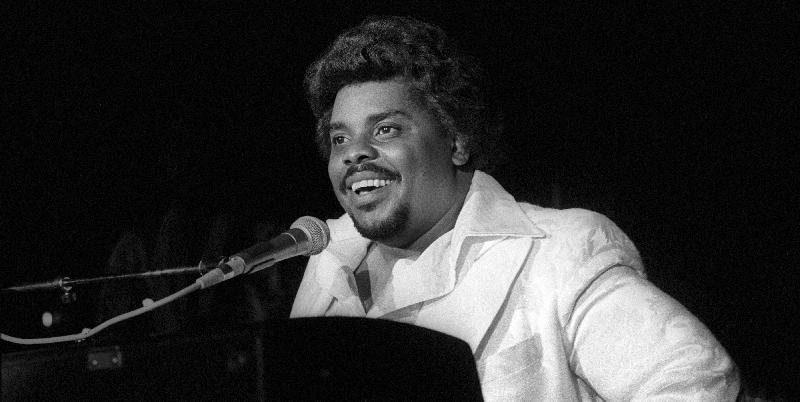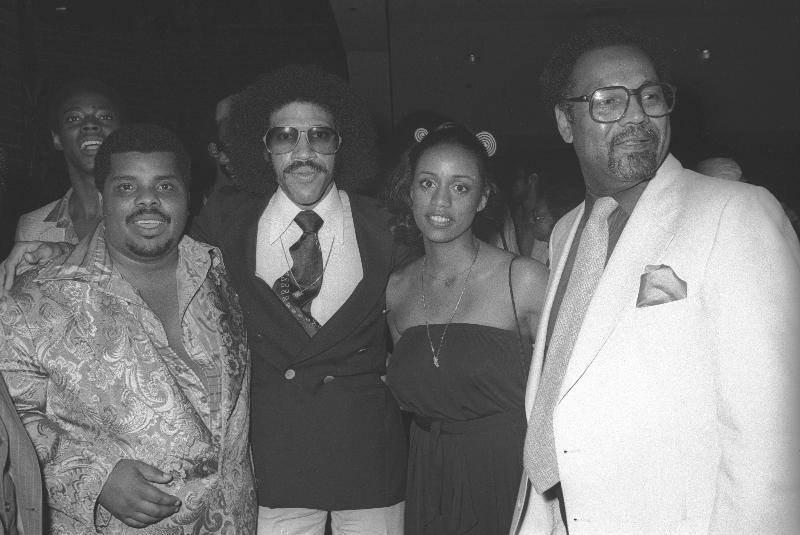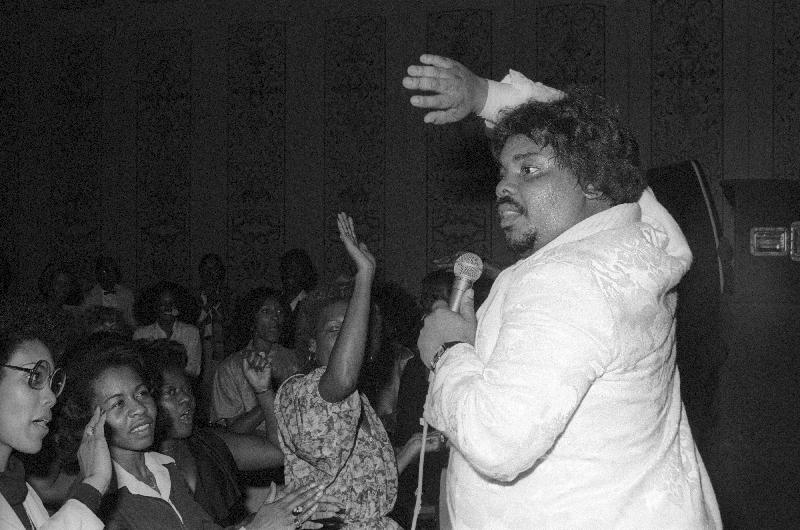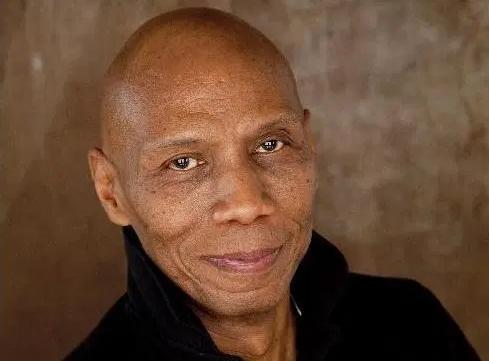Say You Love Me Again Gap Badn

*It was erstwhile in 1978, only after midnight at Total Experience Recording Studios in the heart of Hollywood, and through gigantic wall audio monitors, D.J. Rogers was blasting a track called "Dearest Brought Me Dorsum."
The singer/songwriter/keyboardist had invited me and Bobby The netherlands—fledgling Soul Paper music announcer and the paper's staff photographer, respectively–to hear his new music, and we were eager to oblige.
We didn't even bother to drop off our dates. Subsequently taking them to a concert at the Roxy Theatre, we simply brought the ladies with united states of america to the studio.
D.J. didn't heed. The more ears, the amend. In the studio, there was just the five of us—six, if you lot count Gap Band bassistRobert Wilson, quietly intoxicated more than whatever human should ever be, who periodically wandered in and out of the studio to have an approving listen.
READ THIS: Joy Reid Devotes Segment to Muslim Stereotypes After Trump, Ilhan Omar Accuse Her of 'Islamophobia' [VIDEO]
The so portly Rogers, in a vino colored, long sleeve push button down apparel shirt and gray slacks, alternated between sitting backside the studio audio board turning knobs and occasionally continuing upwards and rocking to the music, occasionally firing off soulful song ad-libs with the groove.
And "Love Brought Me Dorsum" was quite the groove. A mid-tempo system driven past a chugging, funky rhythm department and a choir's worth of joyously singing background session voices, all of information technology accented past dramatic, majestic strings charted by virtuoso arranger Jerry Peters, "Honey Brought Me Dorsum," was more than than the title song of D.J.'s fifth album and his first for Earth, Current of air & Burn founder Maurice White 's Columbia-distributed ARC label; the large, anthemic rail represented the celebrating proclamation of one homo's resilience through funny coin, bad tape deals and contrasted personal woe, to rising back up.
The lyric said "Love" brought him back, but since D.J. never wrote a secular vocal that wasn't a lyric away from being uncut gospel, you knew who he was really singing about.
Recorded in parallel "Wood"—at Total Experience studio, owned by black music impresario, the tardily Lonnie Simmons, D.J.'s director at the time, in Hollywood, and Ike Turner's legendary Bolic Sound facility in Inglewood–the album was going to be D.J.'s undisputed breakout. At least, that'south how Bobby and I felt that dark, and we told a effulgent D.J. every bit much.
MORE ON EURweb: Clarke Peters 'Regrets' Thinking Co-star Chadwick Boseman Was 'Precious' [VIDEO]

I beloved DeWayne Julius Rogers. I say this in nowadays tense because, while he passed away on Baronial 22, D.J. hasn't gone anywhere. Through 8 R&B albums, plenty yet-to- be-released R&B material and extensive recorded work in gospel genre, Mr. Rogers is still here, moving and inspiring us with his music.
Hither, I choose to laurels D.J. by sharing parcels of memories I have of the man.
Kickoff: freely I admit that over the years, during the hundreds of times I've played D.J.'south sentimental "Say You Love Me," I've often listened through tears. Who wouldn't want to feel near somebody what D.J. expresses in the song?
While "Say You Love Me" has been recorded by Natalie Coleand Jennifer Holliday, unwittingly, it's D.J. himself who keeps his song from being covered over and again.
That's considering a cover tin can't do "Say Yous Love Me" justice. What appears elementary is a masterpiece of subtle, intricate chording and the melding of a capable rhythm section, sweetened by the harmonics of ane Keith Hatchell on bass. That arrangement possess a feel that will remain elusive.
So there'due south D.J. Explaining and pleading, his folksy, impassioned delivery transforms often downright corny lyrics into sheer, unmitigated swooning romance. Once again: who wouldn't desire to experience that mode most somebody?
D.J. was down to globe. Funny. Kept me laughing throughout our 1975 interview at RCA'southward Hollywood building. The characterization had just released It'south Adept To Be Alive—featuring "Say You lot Love Me"—D.J.'s second album after he'd released his first on songwriter Leon Russell's Tulsa-based Shelter characterization (where he worked with a fledgling Gap Ring; it was D.J. who introduced them to Lonnie Simmons, who in plow launched Gap, downsized to Charlie, Ronnie and Robert Wilson, into a run of hits), and he was hopeful.
That yr I was at the Troubadour in West Hollywood when D.J. and his band nearly burned the identify down during a rollicking, 2-set ane-night-stand. Onstage, you couldn't fuck with D.J.
He's from the church. That'due south all you have to say, really. If you're a musician in the church, you larn how to make people experience the Spirit. That ability is indispensable.
From Los Angeles, his begetter was a minister and singer. D.J., self-taught on piano, nurtured his skills in various choirs, including that of the legendary Reverend James Cleveland.
And Rogers was a masterful squaller—that time-honored, soul-stirring vocal technique passed down through blackness gospel lineage over the centuries.
Best described equally a cross between the audio of a guttural shout and someone trying to articulate their throat of phlegm while somebody is choking them (okay, so it'due south not the best clarification), a great squaller, like a gale forcefulness air current, can set a listener back on their heels. D.J. would unleash his squall during "Bulah Jean," his churchy, drama-filled, center-tugging show-stopper about a poor, saintly babyhood friend, and bring the house down.

In L.A. I'd become see Rogers anywhere: the Simmons-owned Total Experience nightclub on Crenshaw Blvd; The Name Of The Game Jr., over on Slauson (I think)—and always left a venue pleased and ever astounded by D.J.'southward gift.
Oft referred to as the westward declension'due south Donny Hathaway, vocally Rogers could "run" his ass off. I was at the Shrine Auditorium in 1977 when, during 1 of those zillion-R&B-acts-on-1-neb shows (Ohio Players protégé ring funk band Faze-O opened the evening, playing their hit "Riding High"), an up and coming Peabo Bryson was endmost his set with "Feel The Fire," when out of the wings, mic in hand, emerged D.J. Rogers. The ii went toe-to-toe trading thunderous song runs and ad-lbbs ("OoooOOOOhhhhh!"… "OOOOooohhhhhh!") similar two soul singing gunslingers. It lasted all of a infinitesimal. The Auditorium was on its feet.
Not just a perceptive singer, writer and keyboardist, D.J. was also a great bandleader who trusted the players he chose.
"D.J. would simply let me become," says the legendary bassist Keni Shush, whose aesthetic moaning, bending and string-popping holds down the funky bottom on D.J.'s "Love Brought Me Back." An alumnus of the iconic '70s sibling group The Five Stairsteps ("Ooh Child"), Shush went on to become a solo creative person and producer whose 1982 hit, "Risin' To The Top," is one of the nigh sampled tracks of all time.
"He inspired the musicians he worked with," says Burke, "because he'd permit you do your matter. The rhythm track on 'Love Brought Me Back?' Nosotros cut that in 1 take. D.J. rehearsed u.s. a few times, and so we recorded information technology. He didn't spend fourth dimension doing something over and over; y'all wanna capture that burn on the runway. I loved D.J.; he was similar a big brother to me."
Indeed, both gospel and secular music communities revered Rogers. Amongst the groovy players who insisted D.J. guest on their recordings–Patrice Rushen, who duets with Rogers during the wicked prowl, "Givin' Information technology Upward Is Givin' Up" from her 1979 album, Pizzazz.
Alas, Love Brought Me Back, a vital LP in the Rogers canon, wasn't the commercial success it deserved to be. That—the idea that an artist every bit brilliantly talented equally D.J. never bankrupt out—is non only Rogers' story, just the unfortunate tale of a multitude of deserving acts whose recording careers were shortchanged by a music industry that historically took more than than it gave.
Thankfully, an oftentimes dastardly business didn't stop D.J. Rogers from creating piece of work that every true lover of soul music deserves to hear.

Steven Ivory , veteran journalist, essayist and author, writes about popular culture for magazines, newspapers, radio, TV and the Cyberspace. Answer to him via [e-mail protected]
Source: https://eurweb.com/2020/09/03/steven-ivory-d-j-rogers-say-you-love-me-singer-gone-but-not-forgotten-exclusive-bobby-holland-photos/
0 Response to "Say You Love Me Again Gap Badn"
Post a Comment